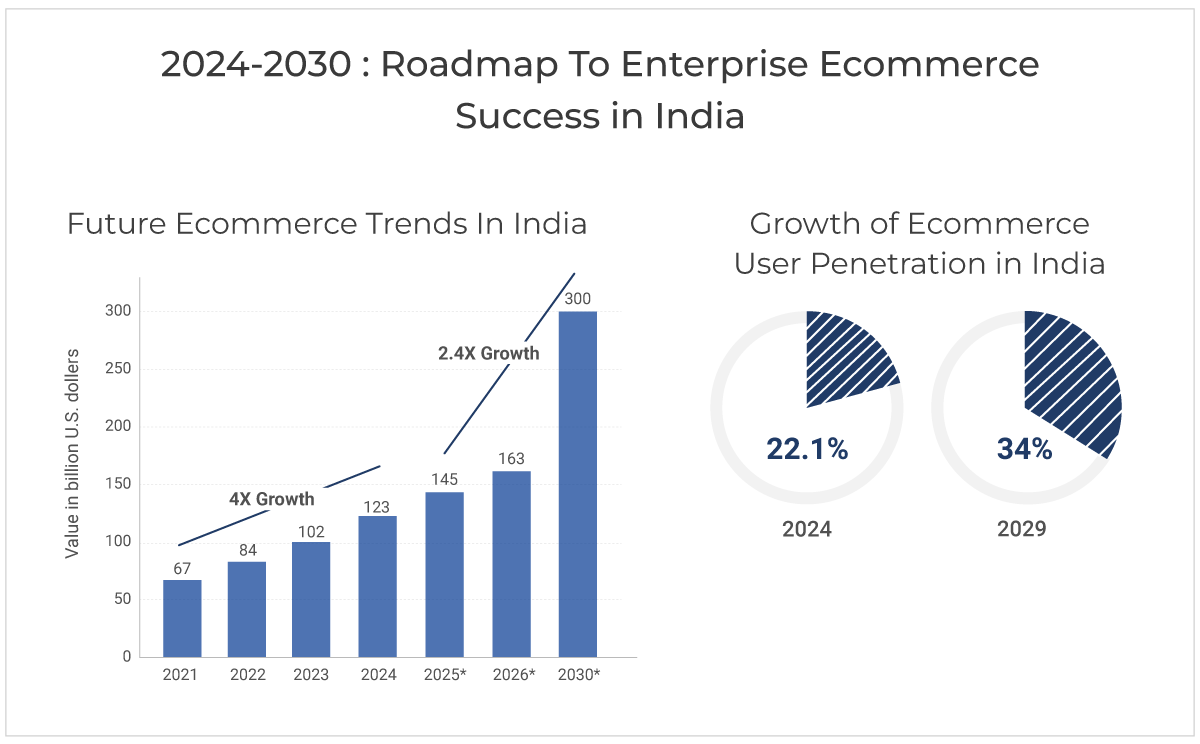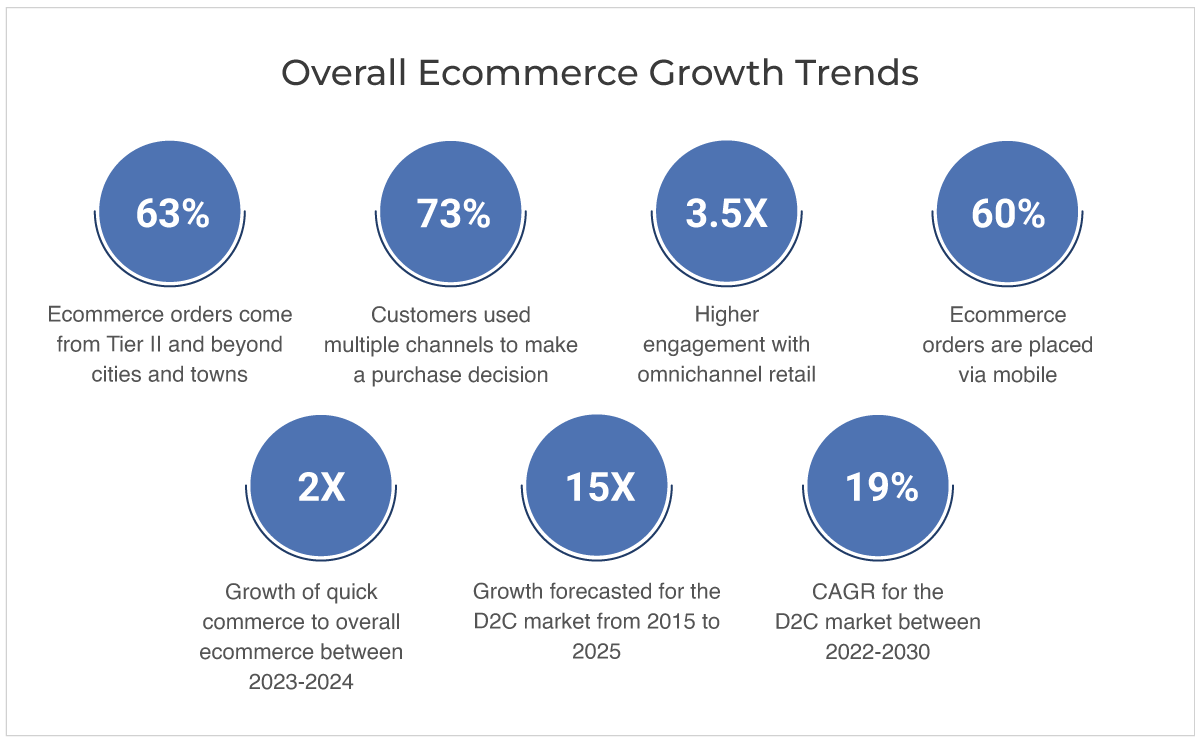For many enterprise businesses that start with Shopify enterprise solutions, finding an alternative becomes essential as the business grows and encounters the platform's limitations.
From the need for extensive customization to better scalability or specific local features, Shopify's one-size-fits-all approach often falls short for rapidly evolving markets like India.
Brands with a disruptive, out-of-box business model or those that are scaling rapidly across markets and verticals often time need tailored solutions that enable agile changes and rapid deployment. With drawbacks like a steep learning curve, complex customizations and costly add-ons, searching for Shopify alternatives becomes mandatory in such scenarios to fulfill the growth aims.
Table of Contents
2024-2030 : Roadmap To Enterprise Ecommerce Success in India
India is one of the fastest growing ecommerce markets with a diverse demographic and immense opportunities for enterprise across industries. With the growing internet penetration there has been a surge in ecommerce adoption beyond Tier I cities.
Not only buyers, but also sellers and vendors from Tier II and III cities are eager to join the ecommerce bandwagon. Also, forecasts predict a continued rapid expansion, offering immense opportunities for businesses to tap into a diverse and growing consumer base.
Let us evaluate some of the latest ecommerce trends to identify the essential features that a Shopify alternative in India should include to harness the full potential of these trends.
Future Ecommerce Trends In India

- 4X+ growth in Indian ecommerce market value from 2020-2024
- 2.4X growth in Indian ecommerce market value from 2024-2030
Growth of Ecommerce User Penetration in India
- 22.1% in 2024
- 34.0% by 2029
Overall Ecommerce Growth Trends

- 63% of ecommerce orders come from Tier II and beyond cities and towns
- 73% of customers used multiple channels to make a purchase decision
- 3.5x higher engagement with omnichannel retail
- 60% ecommerce orders are placed via mobile
- 2X growth of quick commerce to overall ecommerce between 2023-2024
- 15 X growth forecasted for the D2C market from 2015 to 2025
- 19% is the CAGR for the D2C market between 2022-2030
Source: Statista, Business Today, Redseer
The Indian e-commerce sector is witnessing unprecedented growth. To capitalize on this opportunity, businesses must build a robust digital brand presence, using advanced ecommerce platforms tailored to the specific preferences of Indian consumers.
This further underlines the importance of exploring Shopify alternatives that align with the changing demands of the Indian ecommerce market.
7 Non-Negotiable Reasons To Consider Shopify Enterprise Alternatives for Indian Markets
In the rapidly evolving landscape of Indian e-commerce, businesses are increasingly recognizing the limitations of Shopify for their unique needs. Here are seven compelling reasons to explore Shopify enterprise alternatives that better cater to the diverse requirements of the Indian market.
1. Limited Customizations Options
Each enterprise business is unique and so are its requirements. Though Shopify enterprise offers customization options usually the templated designs and complex customizations make it challenging for brands to tweak the frontend or tailor backend processes to their unique needs.
Why this is a problem
- Restricts tweaking the backend and frontend as per the unique business needs of an enterprise brand.
- Building personalized buyer journeys is cumbersome and time taking.
- Some enterprises might face difficulties in integrating their existing local software or service providers.
- Forces Shopify enterprise plan users to rely on multiple third-party apps and workarounds to implement necessary features.
- Limits competitive differentiation as most stores look similar and offer a set type of user experience.
Why Migrate to Shopify Alternatives
Indian enterprise businesses needing customized workflows and tailored business models might consider migrating to Shopify alternatives like StoreHippo that offer a low-code platform, built-in features aligned with Indian markets, and extensive API support that enables seamless integrations with local software and service providers. , and the ability to create custom functionalities without restrictions.
2. Lack of Advanced B2B Features
Though slow to take the online route B2B businesses in India have now started adopting and benefitting from ecommerce. From a market value of $ 5.6 billion in 2021, the B2B market is forecasted to grow 10X+ by 2025 and eventually be worth a $200 billion market by 2030. and to make the most of this boom enterprises need modern, easy-to-use and feature-rich solutions designed for the unique requirements of Indian markets.
With its primary focus on catering to B2C brands, Shopify’s B2B ecommerce solutions are limited in their ability and scope. These limitations along with dependence on apps significantly hinder the growth and efficiency of B2B companies and force them to look for Shopify competitors in the long run.

Why It’s a Problem
- Apps-based setup requires syncing too many third-party apps to achieve the right flow, making the overall setup complex.
- Limited feature or support of advanced tax calculations and GST compliances.
- Limited B2B automation which in turn affects operational efficiency
- Lack of built-in features like tiered pricing, bulk order discounts, customer-specific catalogs, bulk ordering, etc.
- Limits automation of complex B2B workflows, affecting operational efficiency.
Why Replatform to Shopify Competitors
Traditional B2B setups are complex and time-consuming, requiring lots of manual and repeat tasks. To streamline B2B sales and operations, enterprises need ecommerce solutions that are flexible, scalable, and easy to integrate with existing systems. StoreHippo offers enterprise-grade features specifically designed to cater to unique B2B requirements like bulk order management and processing, pricing overrides, RFQ, and more. Enterprises searching for platforms similar to Shopify should go with solutions that have advanced automation tools and a host of features that simplify B2B processes and efficiently handle large volumes of orders.
3. Performance and Scalability Issues for Large Catalogs
As enterprises grow and expand their catalogs, maintaining site performance becomes increasingly challenging. Shopify has been reported to struggle with large catalogs for enterprises with extensive product lines and multiple product variants. Slower server speeds can lead to slow page loads which eventually causes sub-optimal user experience. In the long run, enterprises feel the need to migrate to Shopify alternatives when site speed issues lead to overall customer dissatisfaction and even lost sales.
Why It’s a Problem
- Slower site speeds impact user experience negatively resulting in higher bounce rates.
- Overall site performance is impacted especially during seasonal peak loads or promotional events.
- Slow sites can cost enterprise B2B companies millions in lost sales annually. A 1-second increase in site speed causes 7% reduction in conversions.
- Limited scalability hinders the ability to expand product offerings and grow aggressively.
- Vast catalogs can strain server resources resulting in frequent technical issues.
Why Replatform To Shopify Alternatives
Enterprises need a stay on, scalable platform that can support their growth. The best ecommerce platforms for high-volume businesses are those that offer elastic scalability and built-in solutions to handle large catalogs. StoreHippo supports extensive catalogs with a host of built-in product management features like product options and variants, option sets to highlight distinct product features, product attributes, collections, reviews, and many more. Enterprises looking for websites like Shopify due to cataloging issues can manage their catalogs efficiently on StoreHippo.
4. Rigid Checkout Experience
A seamless and hassle-free checkout process is essential for any online business. Complex checkouts directly impact conversions and customer satisfaction. While Shopify Plus offers better flexibility than Shopify, still its checkout experience is not as desired for many Indian enterprises. Enterprises in India are often compelled to search for homegrown alternatives of Shopify to create a better checkout experience for their diverse buyers beyond Tier I and Tier II cities.
Why It’s a Problem
- Does not integrate well with local payments solutions like UPI, digital wallets and local banks in India making checkout cumbersome
- Shopify’s standard checkout does not support multi-step or single-page checkouts leaving enterprises with a one-size-fits-all solution, lacking flexibility.
- Shopify mandates the use of Shopify Payments in some regions which limits the options brands can offer to their buyers.
- Shopify Payments transaction fees for certain payment methods or high-volume transactions can become hefty impacting overall profitability.
- Limited checkout customizations restrict an optimized checkout flow which in turn impacts conversion rates.
Why Replatform To Shopify Alternatives
Enterprise brands need full control over the checkout process so they can offer tailored checkout experiences usually offering multiple payment options. It becomes imperative for brands to offer the most popular local payment options to their domestic and international clients to boost conversions. With the option to integrate with 60+ domestic and international payment gateways, UPI, digital wallets, store wallet feature, and seamless integrations with local payment solutions, StoreHippo is one of the top choices of enterprise brands planning to migrate to Shopify alternatives.
5. High Dependency on Third-Party Apps
Shopify’s complete infrastructure is built on an extensive app ecosystem, which in turn is a double-edged sword for enterprises. While thousands of apps give enterprises the flexibility to choose their preferred app, relying heavily on third-party apps can increase costs, cause compatibility issues, and further complicate the complex functionalities of an enterprise business. Enterprises seeking a smooth and clean flow might feel a need to migrate to Shopify alternatives to reduce the operational burden of syncing multiple independent apps.
Why It’s a Problem
- Costs can snowball significantly due to additional app subscriptions and fees.
- Increased risk of app conflicts or bugs that can overall functionality or even cause disruptions in order and checkout flows.
- Complicated store management with multiple apps needing periodic updates and maintenance.
- Syncing different independent apps can be time consuming, complex and still lead to inconsistent functionality and performance across the enterprise store.
- Limits scalability as multiple apps can compromise performance and site speed.
Why Replatform To Shopify Competitors
While a rich apps ecosystem is an attraction for Shopify users having a Shopify alternative that incorporates extensive native features suite is definitely an improvement. StoreHippo with its 300+ features and support for diverse business models presents a reliable, advanced and superior solution for Shopify users looking for disruptive growth in the Indian ecommerce markets.
6. Limited Multi-Currency and MultiLingual Support
Enterprise brands planning to foray into global markets need to have an ecommerce provider that supports multiple currencies and languages. While Shopify does provide some functionality in this area, it often falls short, requiring workarounds or third-party apps that can complicate management and degrade user experience. For businesses with a global footprint, these limitations can result in lost sales and customer dissatisfaction and force enterprises to consider websites like Shopify.
Why It’s a Problem
- Inadequate multi-currency support can lead to inconsistencies in pricing across different markets.
- Limited language options may require additional third-party apps, increasing complexity and costs.
- Can create a disjointed customer experience due to inconsistent language and currency display.
- Requires significant manual effort to manage currency and language settings, affecting scalability.
- May fail to comply with local regulations and standards, posing legal risks in some markets.
Why Migrate TO Shopify Alternatives
Enterprise ecommerce platforms with a robust native support for multiple currencies simplify global transactions and help brands to tap global markets. Support for multiple languages enhances customer experience by providing localized content seamlessly. StoreHippo, provides a well-rounded Shopify enterprise alternative with support for 100+ languages and all major currencies. There are no apps or plugins needed to implement multiple languages and currencies.
7. Costly for Growing Enterprises
As businesses scale, controlling costs becomes increasingly important. Shopify’s pricing model, especially for its enterprise-level Shopify Plus, can quickly become expensive due to transaction fees, app subscriptions, and additional costs. For large enterprises, these cumulative enterprise-level Shopify Plus costs, can quickly become a financial burden due to high transaction fees, multiple app subscriptions, and other additional costs. For large enterprises looking to expand without ballooning costs, these cumulative expenses can make Shopify a less attractive option, prompting the search for a more cost-effective alternative of Shopify.
Why It’s a Problem
- High transaction fees can significantly reduce profit margins, especially for high-volume businesses.
- The need for numerous app subscriptions to access essential features adds to operational costs.
- Additional charges for features and services can lead to unpredictable monthly expenses.
- Increased costs can limit a company’s ability to invest in growth initiatives or marketing.
- As businesses expand, Shopify's pricing model can become disproportionately expensive compared to the value received.
Why Replatform To Shopify Competitors
Switching to a platform with a more predictable pricing structure helps enterprise businesses control expenses and invest funds in areas needing growth. Alternatives to Shopify offering built-in, robust features reduce the need for costly third-party apps. StoreHippo offers a feature-rich platform with 300+ native features and 120+seamless integrations offers a cost-effective solution for enterprises of every scale and size.
Conclusion
Shopify, while a popular choice, may not be the ideal fit for all enterprise brands in India. The fast-paced Indian market demands a platform that offers flexibility, local features, and scalability. Shopify alternatives like StoreHippo provide a comprehensive solution tailored to the unique needs of Indian businesses. With extensive support for Indian taxes, languages, omnichannel, and mobile commerce, StoreHippo emerges as a strong contender for enterprise brands seeking a competitive edge.
Ready to give your enterprise brand a platform for disruptive growth? Begin your 14-day StoreHippo free trial today today.























Leave A Comment